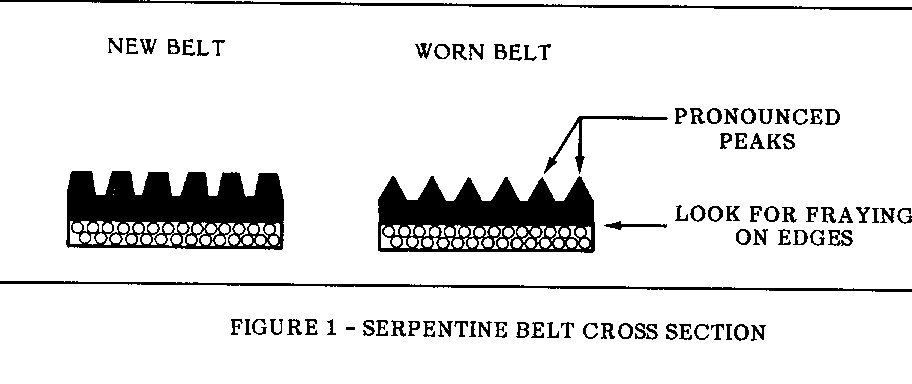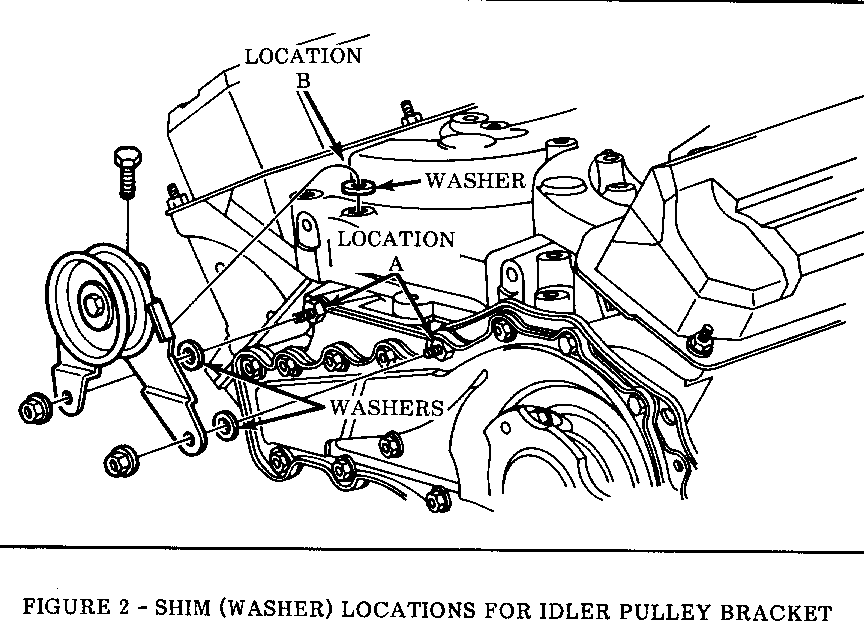BELT WEAR,BELT NOISE-PULLEY MISALIGNMENT- HT4100 ENGINE

VEHICLES AFFECTED: 1985 Devilles and Fleetwoods
Some 1985 Devilles and Fleetwoods equipped with an HT4100 engine may experience serpentine belt wear, noise, and/or misalignment.
The wear is characterized by one or more pronounced peaks on the belt ribs (see Figure 1) and/or fraying on one or both edges of the belt.
Note, fine powder deposits that may be noticeable on the lower wheel well and power steering lines are caused by excess rubber that is left in the grooves or on the back of the belt after manufacture. This is considered a normal condition, and no corrective action is required.
The noise is described as belt squeal or chirp during normal driving.
The misalignment may be evident as a mispositioned belt on the generator pulley (jumped over a groove), a completely disengaged belt, a belt that does not run straight along the idler pulley, or a belt that is contacting either edge of the idler pulley.
All of these conditions may be caused by a misaligned idler pulley or a bent idler pulley bracket. Affected vehicles should be repaired using the service procedure oulined in this bulletin.
NOTICE: Failure to completely remove the idler pulley and bracket assembly during water pump replacement may result in bending of the idler pulley bracket. Follow the water pump removal procedures listed in Section 6B of the 1985 Devukke and Fleetwood Service Information Manual.
SERVICE PROCEDURE:
1. With engine running, inspect belt and note direction of misalignment.
2. Shut off engine and remove belt, idler pulley and bracket.
3. Shim the idler pulley bracket at lccations A and B in Figure 2 as required to obtain proper pulley alignment using 10mm flat washers, P/N 11501032 or equivalent.
4. Tighten the two nuts at location A first, then the bolt at location B. Torque them to 45 N.m (33 ft. lbs.).
5. Reinstall the belt.
6. Start the engine, operate it at idle, and check alignment of belt and its relationship to the idler pulley.
7. If pulley misalignment or interference is still noted, replace the idler pulley bracket and repeat the above procedure.


General Motors bulletins are intended for use by professional technicians, not a "do-it-yourselfer". They are written to inform those technicians of conditions that may occur on some vehicles, or to provide information that could assist in the proper service of a vehicle. Properly trained technicians have the equipment, tools, safety instructions and know-how to do a job properly and safely. If a condition is described, do not assume that the bulletin applies to your vehicle, or that your vehicle will have that condition. See a General Motors dealer servicing your brand of General Motors vehicle for information on whether your vehicle may benefit from the information.
